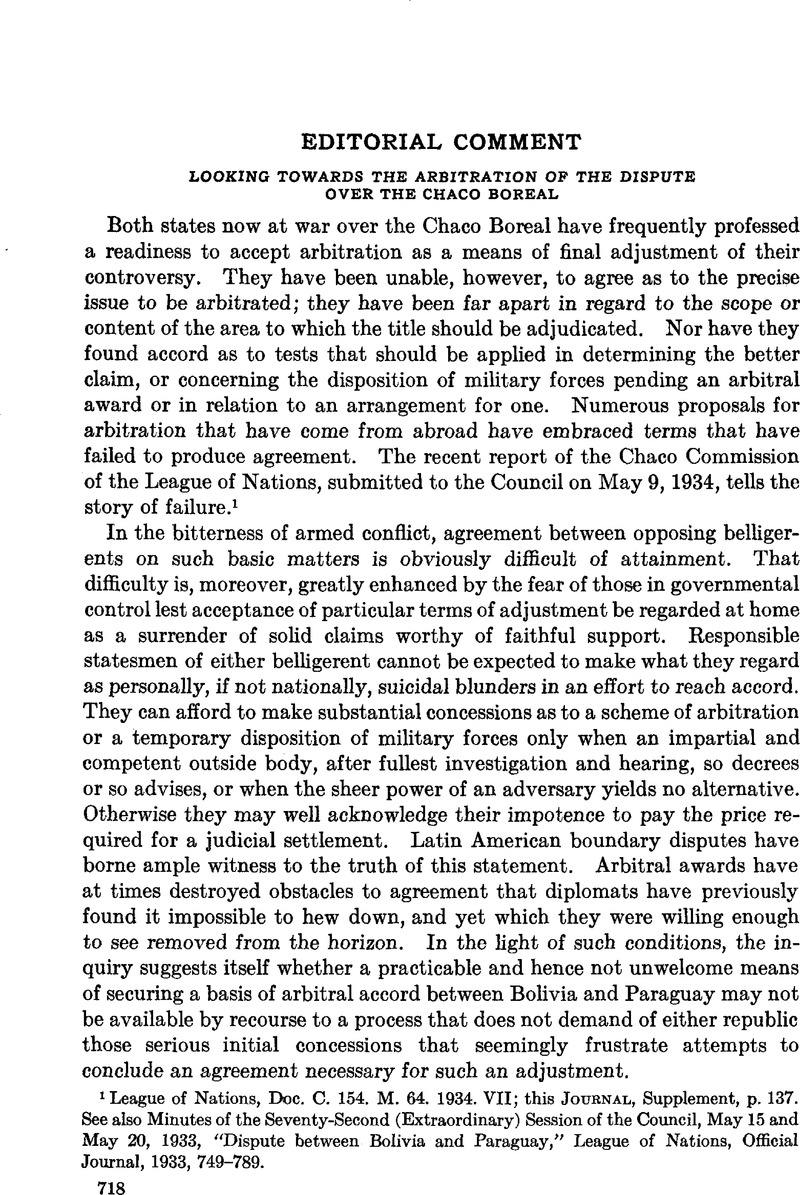Published online by Cambridge University Press: 12 April 2017

1 League of Nations, Doc. C. 154. M. 64. 1934. VII; this Journal, Supplement, p. 137. See also Minutes of the Seventy-Second (Extraordinary) Session of the Council, May 15 and May 20, 1933, “Dispute between Bolivia and Paraguay,” League of Nations, Official Journal, 1933, 749-789.
2 There is an obvious distinction between conferring upon an arbitral tribunal power to determine whether, in case of disagreement between the parties, the issue between them is one which they have agreed to arbitrate, and delegating to such a body power to decide what, in the absence of previous agreement, shall be arbitrated. See, in this connection, minority report by Mr. Root (for himself and Messrs. Cullom and Burton) from the Senate Committee on ForeignRelations, Aug. 18,1911, in relation to proposed general arbitration treaties, with Great Britain and Prance, Senate Doc. No. 98, 62d Cong., 1st Sess., 9-10.
3 The writer has not seen the text of the proposal referred to in an Associated Press despatch from Buenos Aires of Aug. 31,1934, as having been made by Argentina, Brazil and the United States.
4 This is understood to have been the case with respect to the so-called Mendoza Act of Feb. 2,1933. It is not understood that the question touching the relationship of the cessation of hostilities or armistice to an agreement to arbitrate was to be embraced in the matters on which, in case of difficulty, the Permanent Court of International Justice, might be asked for an advisory opinion. See, in this connection, Report of the Chaco Commission, ibid, p. 29 (Supplement to this Journal, p. 171).
5 See, however, Associated Press despatch of Aug. 31, 1934, referring to an acceptance by Paraguay of a proposal from Argentina, Brazil and the United States for a cessation of hostilities while terms of peace should be under discussion.
6 See Report of the Chaco Commission, pp. 35-42 (Supplement to this Journal, pp. 179- 188).
6a See Report of the Chaco Commission, p. 40 (Supplement to this Journal, p. 186).
7 It should be observed also that the Paraguayan Government has sought to have incorporated in a treaty of peace an arrangement for an investigation, under the auspices of the League of Nations, into the responsibility for the origin of the war.
8 It is not sought to be intimated that an agreement for an advisory opinion should precede an armistice, but simply that a cessation of hostilities, however much to be desired at all times, would not be a legal prerequisite to the consummation and performance of an appropriate arrangement for such opinion. It will be borne in mind that an armistice refers both to an agreement between belligerents and to the condition of affairs prevailing during the life of the compact (U. S. Army, Rules of Land Warfare, 1917, Nos. 256a-275). See Hall, International Law, Higgins’ 7th ed., § 192, p. 585. According to an Associated Press despatch of Aug. 31, 1934: “Paraguay accepted and Bolivia was considering today the proposal made by Argentina, Brazil and the United States for cessation of hostilities while terms for peace were discussed at Buenos Aires.“
9 It may here be noted that the draft treaty submitted by the Chaco Commission of the League of Nations to the Council of that body for the acceptance of the states at variance went to the other extreme, and contemplated no cessation of hostilities until twenty-four hours after the entry into force of the arrangement, which was to be ratified according to the constitutional law of the two states and to enter into force twelve hours “after its ratification by both countries.“